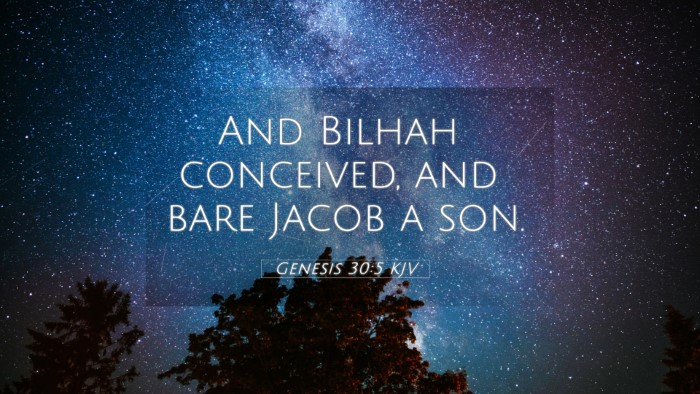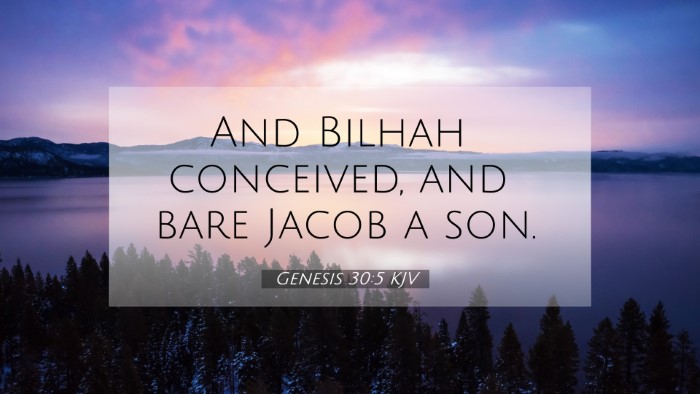Understanding Genesis 30:5
Genesis 30:5 states, "And Bilhah conceived, and bare Jacob a son." This verse reflects the complex dynamics of Jacob's family as well as the evolving themes of struggle and divine favor.
Summary of the Verse
This verse narrates a significant moment in the life of Jacob where Bilhah, Rachel's maidservant, gives birth to a son, Dan. Rachel, who is in competition with her sister Leah for Jacob's affection, employs Bilhah to bear children on her behalf, citing her own barrenness. This act of using a maidservant symbolizes deeper relational and sociocultural issues present in the biblical narrative.
Commentary Insights
Insights from various public domain commentaries illustrate different aspects of this verse:
-
Matthew Henry: Henry highlights the family dynamics and rivalry between Rachel and Leah, emphasizing that Bilhah's conception was a result of Rachel's desperation for children, which reflects the broader themes of faith, patience, and God's providential plan.
-
Albert Barnes: Barnes notes the cultural practices regarding surrogacy in ancient times, focusing on the implications this had for Jacob's family structure. He also emphasizes the notion that divine purposes often unfold amid human complexities and conflicts.
-
Adam Clarke: Clarke draws attention to the significance of names in the biblical context. The name Dan, which means "judge," hints at Rachel's desire for divine justice regarding her position in the family hierarchy. Clarke also elaborates on the theological importance of recognizing that God works through human endeavors and social constructs.
Bible Verse Cross-References
This verse connects to several biblical themes and narratives, including:
- Genesis 29:31-35: The birth of Leah’s children contrasts with Rachel's barrenness, setting the stage for the competition that ensues in this chapter.
- Genesis 31:1: The discord between the sisters carries on into Jacob’s later dealings, showing the lasting impact of their rivalry.
- Genesis 16:2-4: Sarah’s use of Hagar to bear children for Abraham parallels Rachel’s actions, highlighting a recurring theme of surrogate motherhood.
- Exodus 1:15-22: The theme of barrenness and childbearing continues in the plight of the Israelite women under oppression, reflecting on God’s favor and deliverance.
- 1 Chronicles 5:29: The sons of Jacob’s sons are mentioned, connecting the lineage of Israel through essential narratives surrounding them.
- Galatians 4:22-23: The Apostle Paul reflects on the story of Abraham and his sons to discuss the implications of the law and grace, returning the theme of struggle for identity.
- Matthew 1:2-16: The genealogy of Jesus includes Jacob’s sons, showing how these early tensions pave the way for the covenant community leading to Christ.
Exploring Connections Between Bible Verses
Genesis 30:5 serves as a focal point for many connections between Old and New Testament themes, encouraging deeper exploration into:
- The Role of Women: The narratives of Rachel and Leah encourage reflection on the roles of women in scripture and their spiritual significance.
- Divine Justice: The birth of Dan as “judge” invokes reflections on God's justice throughout human history.
- Human Struggle versus Divine Will: This verse exemplifies the ongoing tension of human efforts against God’s overarching plans, a theme prevalent throughout scripture.
- The Use of Surrogacy: The cultural implications of childbearing through servants open dialogues about societal influences on faith and practice.
Conclusion
Genesis 30:5 is rich in thematic content, illustrating the complexities of family relationships, the pursuit of lineage, and the divine hand at work amid human strife. By engaging with this verse through cross-referencing, readers will gain greater insights into God’s unfolding plans throughout the biblical narrative.


